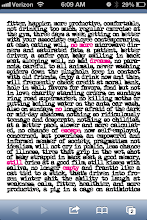I'm not quite finished with the readings, but Then I came across Tatler No.144, I couldn't help but chuckle....and then I started to really think about it in relation to our current day and age and how an article like this may do our society some good. There are definitely parallels between 18th century England that are relevant today (political corruption, obsessions with commodities, frivolous spending, need I go on????). Even though it is not always in the best interest to look at literature or other material of the times in a modern light, I feel that becuase the issues addressed in the Tatler and Spectator are so relavent to what is going on now, it may do us some good to understand the time better by looking at them in relation to our own.
In Tatler No.144, Isaac Bickerstaff writes about how Britain at the time needed a censor to keep frivilous spending in check, especially when it came to purchasing elaborate coaches. He comments about how these coaches wee ruining the roads for the luxury of the select few and were used as a means to bring attention to a select few. "As for my Part, I cannot but admire how Persons, conscious to themselves of no manner of Superiority above others, can out of mere Pride or Laziness expose themselves at this Rate to publick View, and put us all upon pronouncing those Three terrible Syllables, Who is that?" (56). He is critiquing the notion of celebritydom in 18th century England. He goes on to say how puchasing a highly decorated coach served no purpose except to make one stand out among everyone else and outwardly show one's wealth. This made me think of lavish cars, limosines, and celebrities. I also thought about how our magazines and newspapers do the complete opposite of what the Tatler and Spectator do and how there really are no popular news outlets that discourage this type of high consumerism (and if there are some out there, PLEASE let me know what they are! lol). I began to ponder the idea of how our society could use a publication like this that would motivate people to critique the corrupt and disfunctional society we live in (and also reinforced the notion that history repeats itself all too often). Thinking about it in this way makes these publications more relevant to us and helps us realize why they became so popular. These papers sought to provoke thought above and beyond the superficialness that seemed to saturate society at the time.
Going off in another direction, the aim of these papers also paralles what John Gay was attempting to do in The Beggars Opera. Both are working to highlight the common problems of the time, but the Tatler and Spectator take it a step further than Gay does. While Gay simply highlights the corruption and consumerism of his time, the Tatler and Spectator offer ideas to remedy these problems and point them out explicitly, rather than (sort of) implicitly like Gay does. The papers also provoked thought and discussion on these topics within the coffehouses, which The Beggar's Opera did, but probably not to the extent that the papers did (or maybe they were talked about in conjunction...wouldn't that be something....?)
I should probably finish my reading now...or go to bed...whichever happens first....
Monday, February 2, 2009
Subscribe to:
Post Comments (Atom)




Carissa, you are on to something in constructing these historical parallels. It may not be a good idea to try to interpret an 18th c work in 21st c terms, but the reverse --the attempt to understand our culture better by figuring out how those before grappled with similar issues--has to be one of the main reasons we bother to study history at all. And I think you are absolutely right that the time for a hard look at rampant consumerism is now. A&S will continue to discuss this the rest of the readings.
ReplyDelete